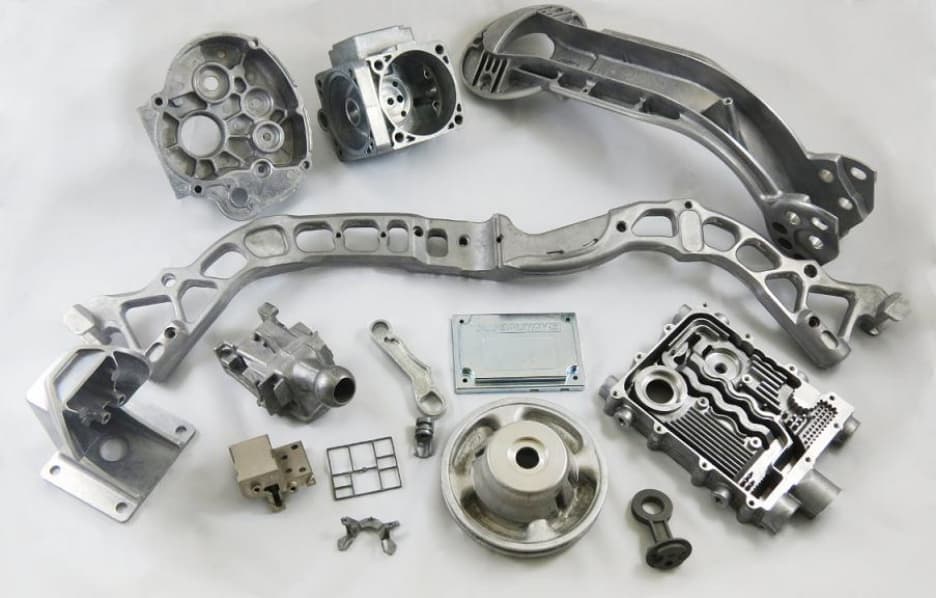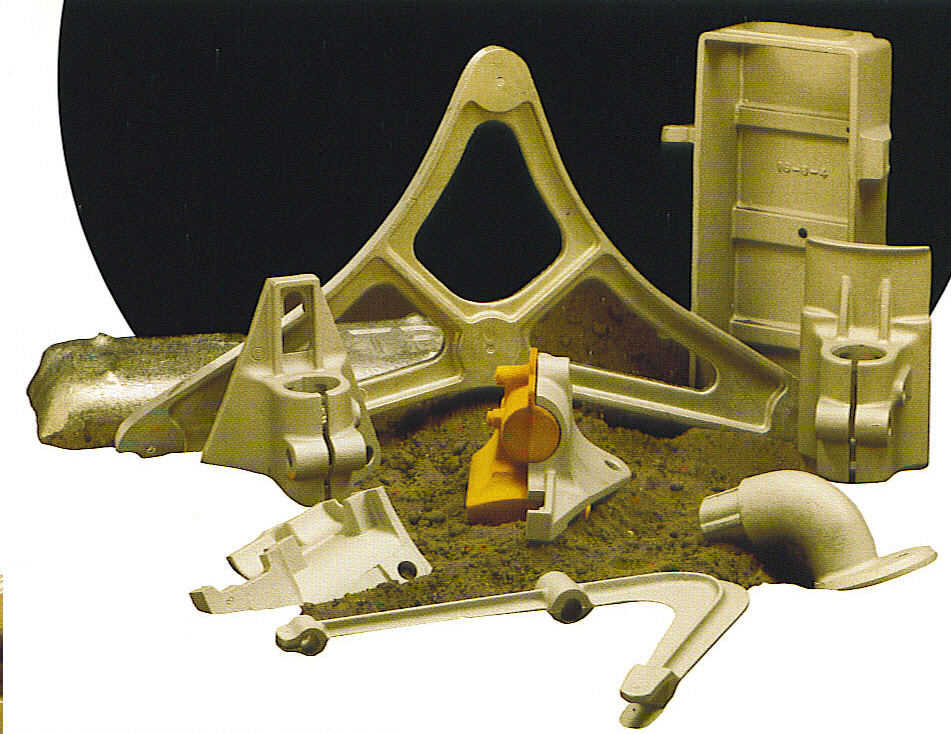Why partnering with Wisconsin Aluminum Foundry ensures quality
How Aluminum Foundry Contributes to Innovative Solutions in Metal Construction
Aluminum shops significantly influence the landscape of steel fabrication. They adopt innovative casting methods that enhance accuracy and design versatility. This capacity permits the production of lightweight and resilient elements that accommodate diverse market needs. Additionally, the assimilation of automation and lasting methods sets a criteria for effectiveness. As these shops progress, they elevate questions about the future of manufacturing and the role of innovation fit the market.
The Duty of Aluminum Foundries in Modern Production
Aluminum foundries play an essential duty in modern-day production, contributing considerably to numerous markets, consisting of automotive, aerospace, and durable goods. These centers specialize in the melting and casting of aluminum, changing basic materials right into premium components that meet rigid sector requirements. The lightweight yet solid buildings of Aluminum make it a perfect selection for producers intending to boost performance while decreasing weight, especially in the automotive sector, where fuel efficiency is critical.
Moreover, Aluminum foundries use innovative procedures to generate complex forms and styles that accommodate particular market needs. By leveraging advanced modern technologies such as computer-aided design and simulation, these shops can optimize their production processes and enhance product utilization. This not only boosts the quality of the last items but also minimizes waste, adding to more sustainable manufacturing practices. Ultimately, the payments of Aluminum foundries are critical for driving innovation and performance throughout numerous industries.
Advanced Casting Techniques Transforming Steel Manufacture
Advanced casting techniques are reinventing the field of metal construction, specifically through accuracy spreading methods that enhance precision and lower waste. Ingenious alloy advancements are likewise playing an important role, permitting personalized properties and enhanced efficiency in different applications. With each other, these improvements are setting new criteria in performance and high quality within Aluminum foundries.
Precision Casting Approaches
As the need for premium components in numerous sectors continues to rise, accuracy spreading techniques have actually arised as a transformative pressure in metal construction. These strategies, including financial investment spreading, lost foam casting, and die casting, permit detailed geometries and limited tolerances that typical techniques commonly have a hard time to achieve. By utilizing sophisticated materials and modern technologies, precision spreading minimizes waste and boosts efficiency, allowing producers to create intricate components with minimized preparations. Furthermore, these approaches give premium surface area finishes and mechanical residential properties, making them perfect for industries such as aerospace, vehicle, and medical devices. As suppliers significantly adopt accuracy spreading, the capability to fulfill details style needs while maintaining cost-effectiveness becomes a pivotal benefit in today's competitive market.
Ingenious Alloy Developments
Innovative alloy advancements are reshaping the landscape of steel manufacture, especially within the domain name of precision casting. Advancements in material scientific research have resulted in the creation of specialized Aluminum alloys that enhance longevity, toughness, and resistance to corrosion. These unique alloys allow shops to generate elaborate components with enhanced mechanical buildings, satisfying varied markets such as aerospace, vehicle, and electronics. The unification of innovative casting strategies, including die casting and sand spreading, more optimizes using these materials, enabling complicated geometries and reduced waste. As an outcome, manufacturers are better outfitted to satisfy stringent performance criteria while lessening ecological influence. Inevitably, these ingenious alloys are leading the way for a new era of performance and sustainability in metal construction.
Lightweight and Resilient: The Advantages of Aluminum Components
Aluminum parts provide significant advantages in various applications as a result of their lightweight nature and longevity. This combination adds to improved fuel effectiveness, particularly in the aerospace and auto industries. Additionally, aluminum's intrinsic deterioration resistance even more prolongs the life expectancy of items, making it a favored option in many metal fabrication processes.
Enhanced Gas Effectiveness
While typical products have long been the criterion in various markets, the shift in the direction of Aluminum components is changing the landscape of metal fabrication, particularly in regard to boosted gas performance. Aluminum's lightweight nature notably lowers the general weight of vehicles and machinery, permitting boosted efficiency and decreased power consumption. This decrease in weight translates straight to lower gas usage, making Aluminum an attractive choice for manufacturers aiming to fulfill rigid environmental guidelines. On top of that, light weight aluminum's sturdiness guarantees that components preserve their stability with time, adding to long-lasting effectiveness. As industries progressively focus on sustainability, the adoption of Aluminum parts ends up being a strategic selection, straightening functional objectives with ecological duty while improving gas efficiency in numerous applications.
Deterioration Resistance Perks
One of the standout features of Aluminum elements is their phenomenal corrosion resistance, which greatly boosts the longevity and reliability of different applications. This building is particularly useful in rough settings, such as aquatic and commercial settings, where direct exposure to moisture and chemicals can bring about substantial destruction in various other metals. Unlike steel, Aluminum naturally forms a safety oxide layer that serves as a barrier against ecological components, reducing the risk of rust and corrosion. Because of this, Aluminum elements need less maintenance and have a longer life span, making them an economical selection for makers. This integral toughness not only contributes to the total performance of products but additionally supports sustainability initiatives by minimizing the need for constant substitutes.
Advancements in Style and Design Via Aluminum Foundries
As improvements in Aluminum Foundry technology continue to reshape the landscape of metal fabrication, innovative design and design options are arising to meet the needs of diverse industries. The convenience of Aluminum enables elaborate styles that were formerly unattainable with standard materials. Foundries are leveraging computer-aided style (CAD) software program and simulation devices to maximize the design process, making it possible for engineers to develop light-weight yet robust elements tailored to details applications.
The capacity to integrate innovative alloying techniques permits the modification of Aluminum residential or commercial properties, boosting toughness and sturdiness. This versatility promotes creativity in item advancement, enabling firms to explore brand-new forms and structures that improve capability while decreasing weight. Collaborative initiatives between designers and factories help with fast prototyping, resulting in shorter task timelines and enhanced general performance. These developments not only improve item performance yet additionally drive sustainability by decreasing material waste throughout the construction procedure.
Enhancing Efficiency With State-Of-The-Art Modern Technology
Improvements in advanced modern technology are changing the effectiveness of Aluminum shops, enhancing procedures from design to production. Automation plays an essential function, with robot systems improving the speed and accuracy of jobs such as molding, putting, and completing. These automated solutions lessen human error and reduce labor prices, while additionally enhancing output uniformity.
Furthermore, the integration of innovative software program for computer-aided layout (CAD) and simulation permits rapid prototyping and testing, speeding up the change from idea to production. Factories are using real-time data analytics to keep an eye on procedures, making sure peak efficiency and lessening downtime.
3D printing modern technology is being embraced for producing complex mold and mildews and components, reducing material waste and lead times. The combination of these innovative innovations not only increases performance however also improves the quality of Aluminum products, positioning foundries at the center of advancement in steel fabrication.
Sustainable Practices in Aluminum Foundries
A growing variety of Aluminum foundries are embracing lasting methods to minimize their ecological effect and advertise resource efficiency. Aluminum Foundry. These factories are significantly carrying out reusing programs, where scrap Aluminum is gathered and reprocessed, considerably reducing waste. Furthermore, energy-efficient technologies, such as electric furnaces and progressed insulation materials, are being used to lower power usage throughout the melting process
Water conservation techniques are additionally getting traction, with several foundries reusing water in cooling down systems to lower overall use. The adoption of environment-friendly layers and additives reduces harmful discharges without endangering item top quality.
Future Trends in Aluminum Casting and Metalworking
Progressively, the future of Aluminum spreading and metalworking is being shaped by technical technologies and progressing market criteria. Innovations in automation and robotics are streamlining processes, improving precision, and reducing labor prices. The adoption of additive production methods, such as 3D printing, is transforming traditional casting approaches, permitting for intricate geometries and decreased material waste.
Moreover, the combination of expert system and information analytics is enabling real-time tracking and anticipating maintenance, which enhances production performance. Sustainability continues to be a core focus, with firms buying environmentally friendly practices, including the recycling of Aluminum scrap and the usage of sustainable power sources in production.
As the demand for lightweight, long lasting materials in various sectors boosts, Aluminum factories have to adjust by boosting and establishing innovative alloys spreading methods. These fads jointly indicate a future where Aluminum spreading and metalworking are more efficient, sustainable, and receptive to market demands.

Regularly Asked Inquiries
What Kinds Of Aluminum Alloys Are Typically Utilized in Factories?
Frequently utilized Aluminum alloys in factories include 2xxx collection (copper), 3xxx collection (manganese), 4xxx collection (silicon), 5xxx series (magnesium), and 6xxx collection (magnesium and silicon), each offering unique properties ideal for different applications.
How Does Aluminum Spreading Contrast to Other Steel Fabrication Approaches?
Aluminum casting deals benefits such as lower production costs and complex shapes contrasted to typical construction techniques. It provides exceptional dimensional precision and surface finish, making it a preferred selection for numerous sectors over alternatives like machining or welding.
What Precaution Are Implemented in Aluminum Foundries?
Aluminum foundries execute different precaution, including personal protective tools, ventilation systems, normal safety training, risk analyses, and emergency methods to safeguard employees from dangers linked with molten steel, heat, and potential chemical exposure. Wisconsin Aluminum Foundry.
How Can Companies Discover Trustworthy Aluminum Foundry Partners?
Firms can Metal Castings identify trusted Aluminum Foundry partners by evaluating industry track record, examining client endorsements, appraising top quality qualifications, thinking about manufacturing capacities, and conducting site brows through to assure positioning with their certain demands and standards.

What Is the Regular Lead Time for Aluminum Casting Projects?
The typical lead time for Aluminum casting tasks varies from two to eight weeks, relying on aspects such as layout intricacy, production quantity, and the factory's ability to meet certain job needs and timelines.
Aluminum factories play a vital role in modern-day manufacturing, contributing substantially to different industries, including automobile, aerospace, and customer items. As advancements in Aluminum Foundry innovation proceed to reshape the landscape of steel manufacture, ingenious layout and design solutions are emerging to meet the demands of varied markets. Advancements in advanced technology are reinventing the effectiveness of Aluminum factories, simplifying processes from layout to production (Metal Castings). A growing number of Aluminum factories are taking on sustainable methods to reduce their ecological effect and advertise source effectiveness. As the need for lightweight, durable materials in various markets rises, Aluminum shops have to adapt by establishing innovative alloys and enhancing spreading methods